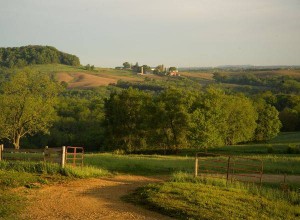I just returned home from a retreat at a Monastery in Iowa (pictured above) where I lived alone in the “Guest House”, located on 650 acres of managed woodlands. What a gift I was given to get away with God in the wilderness…so quiet and peaceful. Which brings me to this weeks study from the book of Hosea. I will return to Psalms 119 with the letter Hei (ה) next week.
Hosea 2:14 Therefore, behold, I will allure her, Bring her into the wilderness And speak kindly to her.
In context, this verse is speaking of Hosea’s adulterous wife Gomer, who represents God’s unfaithful Bride, Israel. God has instructed Hosea to take a harlot for a wife to embody the very message he is to convey… to feel what God feels and to understand what He thinks. Knowing God’s heart is what gives him the prophetic voice. I’ve heard it said “poor Hosea, such an unfortunate marriage and such personal tragedy”. I guess it’s just a matter of perspective…whether from a temporal or an eternal view. For me, I say what an honor that God would allow Hosea to share in His heart this way.
I will allure is the Hebrew word “pathah” (פתה) and is in a piel form which intensifies its meaning, so it should read “I will seduce her into the wilderness and speak…”. How will He seduce her? Well, I looked at the letters of this word and see esoterically that He will speak words (פ) of truth (ת) while she is in this place of weakness and brokeness (ה).
The words wilderness “midbar” (דבר
Verse 1:5 Gomer has said “I will go after my lovers, who give me my bread and my water, my wool and my flax, my oil and my drink”. In a heart wrenching reply, v. 8 says, “For she does not know that it was I who gave her the grain, new wine…which she used for Baal”. So in verse 12. God is going to destroy her vines and trees, of which she said are her wages and (v.13) punish her. The word punish “פקד” is in a simple kal verbal form so it doesn’t so much mean punish as “examine”…to see if there is any hope for a restored relationship. The first time this word is used in scripture is in Gen.21:1 where the Lord intervened on behalf of Sarah in a miraculous way so that she could conceive at an advanced age. The undercurrent meaning of this word is an action on the part of God which produces a beneficial result to His people.
After He seduces His Bride into the wilderness He says in verse 15. “Then I will give her vineyards from there, And the valley of Achor as a door of hope. And she will sing there as in the days of her youth, As in the day when she came up from the land of Egypt. Jeremiah 2:2 later echoes the same sentiment: “Go and proclaim in the ears of Jerusalem, saying, ‘Thus says the LORD, “I remember concerning you the devotion of your youth, The love of your betrothals, Your following after Me in the wilderness, Through a land not sown”. God views the time in Israels wandering in the wilderness, as if it were a honeymoon with His Bride. A time when they were alone together and she was fully dependent upon Him. He wants to return to that time of first love.
While on retreat I took a walk every morning and early evening. There was a long road with open pasture on both sides and a vast open sky above. On my walks I could see the moon prominently on one side and the sun prominently on the other, with the long path both in front and behind me. The scene was as simplistic as a child’s painting, yet as beautiful as a masterpiece. This is a picture of where I find myself in life. I’m in a very transitory time, as many of you may find yourselves as well. Somewhere in between the “old” and “new day”. The Lord reminded me of the words “I will speak tenderly to her”…literally, “I will speak over her heart”. When the word over (על) is not used as a preposition it has two possible root words which can mean to blossom, and to arise like the dawn and, and the other root meaning, the setting of the sun. This is a perfect time to be reminded of the romance of walking by faith and how God cherishes our love and faithfulness as when we first began our walk with Him.
Here is a poem that Sister Carol, from the Monastery, felt led to give me the day I was leaving:
The Treasure of Our Heart
Nothing is more practical than finding God, than falling in Love in a quite absolute, final way.
What you are in love with, what seizes your imagination, will affect everything.
It will decide what will get you out of bed in the morning, what you do with your evenings, how you spend your weekends,
What you read, whom you know, what breaks your heart, and what amazes you with joy and gratitude.
Fall in Love, stay in love, and it will decide everything.
-Pedro Arrupe
This word study has gone long so I cannot share how I communed, yes, “talked” with the animals while in the wilderness…and yes, it is Biblical. Chaim has a new book out “A Hebrew teacher’s call to silence”, where ironically, he shares about his expiriences with “Yiredu”: talking with God’s creatures. Also, we will soon offer a pod cast on our home page where Chaim teaches about this subject. So if you are an animal lover, or just someone who loves talking with God any and every way, you’ll want to check out these resources.
Laura








Recent Comments